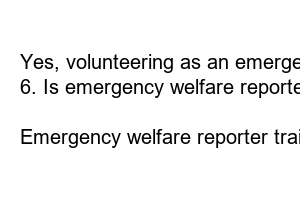긴급복지 신고의무자 교육
Title: Emergency Welfare Reporter Training: Be Prepared and Make a Difference
Introduction:
In times of crisis, emergency welfare reporters play a crucial role in ensuring the safety and well-being of individuals and communities. These dedicated individuals are trained to respond quickly and effectively during emergency situations, providing necessary support and resources to those in need. This blog post explores the importance of emergency welfare reporter training, highlighting the valuable skills gained and the positive impact it can have on society.
1. The Role of an Emergency Welfare Reporter:
Emergency welfare reporters are on the frontline, assisting and reporting on emergency situations. They play a pivotal role in providing immediate aid, assessing needs, coordinating rescue efforts, and safeguarding the affected population. Their presence ensures that critical services and resources are efficiently distributed to those affected by an emergency, enhancing response and recovery efforts.
2. Comprehensive Training Program:
Emergency welfare reporter training programs are designed to equip individuals with a comprehensive skill set required in emergency situations. Training includes courses in disaster response, emergency management, first aid, communication skills, emotional support, and conflict resolution. By acquiring these skills, reporters are better prepared to handle the challenges that arise during crisis situations.
3. Rapid Response and Adaptive Thinking:
During emergencies, rapid decision-making and adaptability are paramount. Emergency welfare reporter training helps individuals develop critical thinking skills and the ability to quickly assess and respond to rapidly changing circumstances. By learning how to stay calm under pressure and make informed decisions, reporters can effectively help those in need and ensure their safety.
4. Effective Communication and Coordination:
Clear and effective communication is key in emergency situations. Reporters are trained to communicate with diverse groups of people, including responders, victims, and members of the community. Training empowers them to gather and disseminate information efficiently, collaborate with other agencies, and coordinate relief efforts seamlessly.
5. Resilience and Emotional Support Skills:
Witnessing the aftermath of a disaster can be distressing and emotionally challenging. Emergency welfare reporter training places great emphasis on developing resilience and promoting self-care. Trainees learn how to recognize and manage their own emotions while providing compassionate support to survivors and affected individuals. By doing so, they can offer much-needed comfort and aid in the recovery process.
6. Fostering Community Resilience:
Emergency welfare reporter training goes beyond just the immediate response. It also focuses on enhancing community resilience and preparedness for future emergencies. Reporters can educate communities on disaster preparedness and provide valuable resources for creating emergency plans and kits. This proactive approach strengthens community cohesion and ensures that they are better equipped to face future crises.
FAQs:
1. What qualifications are required to become an emergency welfare reporter?
To become an emergency welfare reporter, it is beneficial to have a background in emergency services, social work, or community development. Many training programs also require a minimum level of education, often ranging from a high school diploma to a bachelor’s degree.
2. Are there any age restrictions for emergency welfare reporter training?
While some programs may have age restrictions, many welcome individuals from different age groups. Commitment, passion, and a willingness to learn are more crucial than age when it comes to becoming an effective emergency welfare reporter.
3. How long does emergency welfare reporter training last?
Training programs can vary in length, ranging from a few weeks to several months. The duration typically depends on the depth and breadth of the curriculum, as well as the level of certification desired.
4. What career opportunities are available for emergency welfare reporters?
Emergency welfare reporters can find employment in various sectors, including government agencies, non-profit organizations, humanitarian aid organizations, and emergency management agencies. They can also work as consultants or freelancers, providing expertise in disaster response and recovery.
5. Can I volunteer as an emergency welfare reporter?
Yes, volunteering as an emergency welfare reporter is a great way to contribute to your community. Many organizations and local agencies welcome volunteers who have completed the necessary training.
6. Is emergency welfare reporter training available online?
Yes, there are online training programs available that offer the flexibility to learn at your own pace. However, it is essential to choose recognized and accredited programs that provide interactive and engaging learning experiences.
Summary:
Emergency welfare reporter training equips individuals with the skills needed to respond effectively during emergencies. From rapid decision-making and effective communication to emotional support and community resilience, these reporters play a pivotal role in achieving a successful response and recovery. Whether as a career path or a volunteer opportunity, becoming an emergency welfare reporter is a valuable way to make a positive impact in times of crisis.

